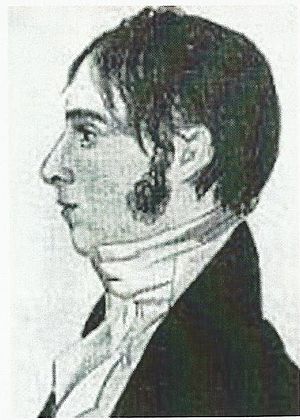Watty Graham facts for kids
Quick facts for kids
Walter (Watty) Graham
|
|
|---|---|
 |
|
| Born | 1763 Maghera, County Londonderry, Ireland
|
| Died | 1798 Maghera
|
| Occupation | Farmer, Reformed Presbyterian Church elder |
| Organization | National Guard, Maghera |
| Movement | Society of United Irishmen |
Walter (Watty) Graham (1763–1798) was a farmer and a leader in his local Presbyterian Church in northern Ireland. He was executed for his part in the Rebellion of 1798 as a member of the United Irishmen.
Contents
Walter Graham: A Leader in the 1798 Rebellion
Early Life and Influences
Walter Graham was born near Maghera, in County Londonderry. Like his father, he was an elder in their local Presbyterian church. In the early 1790s, the church minister, John Glendy, often spoke about why democratic changes were important. He even celebrated the French Revolution.
Graham and others from his church supported Glendy's ideas. They reported his sermons in the United Irish newspaper, the Northern Star. Glendy once praised a French victory in 1792. He called it a sign from heaven for the French people and for everyone's freedom.
Joining the United Irishmen
As a representative at church meetings in Dublin, Graham met the leaders of the United Irishmen. This group wanted Ireland to be a republic, meaning it would be a country ruled by its people, not a king. They hoped France would help them.
With strict new rules being put in place, the United Irishmen began to plan a rebellion. Graham and his church members in Maghera formed a new group. They called themselves the National Guard, like the French.
Planning the Uprising
Their plan was to rise up at the same time as other towns. They would take weapons from local armed groups. Then, they would march to join other rebels. This was all part of a bigger plan to fight for a new government.
However, many United Irish leaders were arrested. Two weeks after the rebellion started in the south, Graham got orders. Henry Joy McCracken, a leader in County Antrim, told him to march to Antrim.
The Battle of Antrim and Its Aftermath
On June 7, 1798, Graham gathered several hundred men. They held Maghera that night. The next morning, they marched to Crewe Hill. But then, news arrived that McCracken had been defeated.
A large government army was also approaching. Graham and other leaders decided they couldn't win. They had few guns and no cannons. Most of their group fled, but some stayed and fought small battles.
In the days that followed, many people were punished. The Maghera Presbyterian Church was burned.
Capture and Legacy
Walter Graham tried to escape by boarding a ship. But he was betrayed by someone he knew. On June 19, Graham was hanged in Maghera. His execution was very harsh, meant to scare others.
Henry Cooke, a later church leader, remembered seeing soldiers burn Graham's house. Graham's wife and daughter later moved to the United States.
Today, the local GAA Club in Maghera is named in Walter Graham's honor. This shows he is still remembered as an important figure in Irish history.
Images for kids
 | Stephanie Wilson |
 | Charles Bolden |
 | Ronald McNair |
 | Frederick D. Gregory |


